Texas
- Lafyva

- Jan 20, 2025
- 11 min read
Updated: Jan 25
Essentially all Texas English phonologically falls under the Southeastern super-dialect region of the United States and often specifically the Southern dialect region, though noticeably not the cities of El Paso, Abilene, and Austin, and not particularly Houston and Corpus Christi.[2] Moreover, as of 21st-century research, the accents of Dallas show enormous variability.[10]
Some linguists draw dialect boundaries based upon phonological (sound-pattern) differences and others on lexical (word-usage) differences, leading to various views on how to classify dialects in Texas, often by dividing the state into an eastern versus a western dialect region.[7] 20th-century lexical research delimited Texas into two "layers": a southern Texas layer along the Mexican border with several Spanish loanwords and a central Texas layer settled by speakers of German and other European languages amidst a dominant Anglo-American settlement.[8][9] 21st-century phonological research reveals accents in Texas grouped in a way not easy to demarcate in terms of simple geographical boundaries,[10] and ongoing research reveals an urban–rural divide within Texas becoming more significant than a region-wide divide.

According to Elazar, Texas's political culture is a combination of traditionalistic and individualistic elements. The traditionalistic aspects of state politics are exemplified by the long history of one-party dominance in state politics, the low level of voter turnout, and social and economic conservatism. The individualistic nature of state politics can be seen in the support for private business, opposition to big government, and faith in individual initiative.


The Baptists separated from the Church of England because they believed church membership should be voluntary and that only believers should be baptized. They rejected the parish structure of the Church of England where people were "born" into the church and baptized as infants. John Smyth led the first congregation; Thomas Helwys traveled back to England the founded the first Baptist church there in 1612. The first Baptist church in North America was established by Roger Williams in what today is Providence, Rhode Island; soon thereafter, John Clarke founded a Baptist church in Newport, R.I.





The Republican Party, retroactively called the Democratic-Republican Party (a modern term created by modern historians and political scientists), and also referred to as the Jeffersonian Republican Party among other names,[a] was an American political party founded by Thomas Jefferson and James Madison in the early 1790s that championed liberalism, republicanism, individual liberty, equal rights, decentralization, free markets, free trade, agrarianism, and sympathy with the French Revolution. The party became increasingly dominant after the 1800 elections as the opposing Federalist Party collapsed.
In full: James Madison, Jr.
Born: March 16 [March 5, Old Style], 1751, Port Conway, Virginia [U.S.]
Died: June 28, 1836, Montpelier, Virginia, U.S. (aged 85)
Title / Office: presidency of the United States of America (1809-1817), United States House of Representatives (1789-1797), United States Continental Congress (1780-1783), United States
Political Affiliation: Democratic-Republican Party
Awards And Honors: Hall of Fame (1905)
The Federalist Papers is a collection of 85 articles and essays written by Alexander Hamilton, James Madison, and John Jay under the collective pseudonym "Publius" to promote the ratification of the Constitution of the United States. The collection was commonly known as The Federalist until the name The Federalist Papers emerged in the twentieth century.
James Madison (March 16, 1751[b] – June 28, 1836) was an American statesman, diplomat, and Founding Father who served as the 4th president of the United States from 1809 to 1817. He is hailed as the "Father of the Constitution" for his pivotal role in drafting and promoting the Constitution of the United States and the Bill of Rights. Disillusioned by the weak national government established by the Articles of Confederation, he helped organize the Constitutional Convention, which produced a new constitution. Madison's Virginia Plan served as the basis for the Constitutional Convention's deliberations, and he was one of the most influential individuals at the convention. He became one of the leaders in the movement to ratify the Constitution, and he joined with Alexander Hamilton and John Jay in writing The Federalist Papers, a series of pro-ratification essays that was one of the most influential works of political science in American history.
Stilling their opposition in order to support the first administration of U.S. Pres. George Washington, the Anti-Federalists in 1791 became the nucleus of the Jeffersonian Republican Party (subsequently Democratic-Republican, finally Democratic) as strict constructionists of the new Constitution and in opposition to a strong national fiscal policy.
From 1794 to 1797, Thomas Jefferson operated as the informal leader of what would become the nation's first opposition political party, the Democratic-Republicans.
The Democratic-Republican Party was founded in 1791-92 by Thomas Jefferson and James Madison.
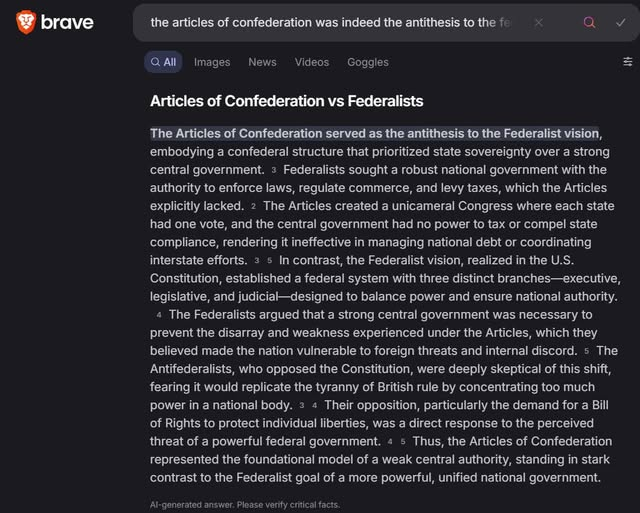

AI Overview
Yes, the Articles of Confederation were designed against the principles of federalism, as they created a very weak central government with most power residing with the individual states, essentially forming a confederacy where states retained primary sovereignty rather than sharing power with a national government; this stands in direct contrast to the federalist system established by the later U.S. Constitution.
Key points about the Articles of Confederation and federalism:
Limited national power:Under the Articles, the national government had very limited powers, including no ability to directly tax citizens or regulate interstate commerce, making it heavily reliant on the states for funding and cooperation.
State sovereignty:The Articles emphasized the individual sovereignty of each state, allowing them to act largely independently from the national government.
No strong executive or judiciary:The Articles lacked a separate executive or judicial branch, further weakening the central government.
Unanimous consent required:Any significant changes to the Articles required unanimous agreement from all states, making amendments nearly impossible.
AI Overview
Yes, Federalists strongly opposed the Articles of Confederation during the Revolutionary War, arguing that it created a weak central government that could not effectively lead the nation and needed to be replaced with a stronger constitution with more power vested in the federal government.
Key points about Federalists and the Articles of Confederation:
Weakness of the Articles:
Federalists believed the Articles gave too much power to individual states and not enough to the national government, making it difficult to raise taxes, regulate trade, and maintain stability.
Need for a strong central government:
They advocated for a new constitution that would establish a stronger federal government capable of addressing national issues like defense and economic policy.
"The Federalist Papers":
To support their arguments, prominent Federalists like Alexander Hamilton, James Madison, and John Jay wrote a series of essays called "The Federalist Papers" explaining the benefits of a stronger national government.
Yes, Federalists, who supported the Constitution and a strong federal government, opposed the Bill of Rights. They believed that the Constitution already protected individual rights, and that a bill of rights was unnecessary and even dangerous. For example, Alexander Hamilton wrote in Federalist No. 84 that bills of rights were originally agreements between kings and their subjects, and were not applicable to constitutions based on the power of the people. Federalists also argued that no list of rights could be complete, and that it was best to not have a list at all. They also believed that omitting a right from the Bill of Rights could set a dangerous precedent, implying that the individual did not have that right.
However, Federalists did eventually promise to add amendments to the Constitution to protect individual liberties. In 1789, James Madison introduced 12 amendments to the First Congress, and the states ratified 10 of them, which became known as the Bill of Rights and took effect in 1791.
Generative AI is experimental.
The Articles of Confederation were adopted by the Continental Congress on November 15, 1777. This document served as the United States' first constitution. It was in force from March 1, 1781, until 1789 when the present-day Constitution went into effect.
The Anti-Federalists opposed the ratification of the 1787 U.S. Constitution because they feared that the new national government would be too powerful and thus threaten individual liberties, given the absence of a bill of rights.
Their opposition was an important factor leading to the adoption of the First Amendment and the other nine amendments that constitute the Bill of Rights.
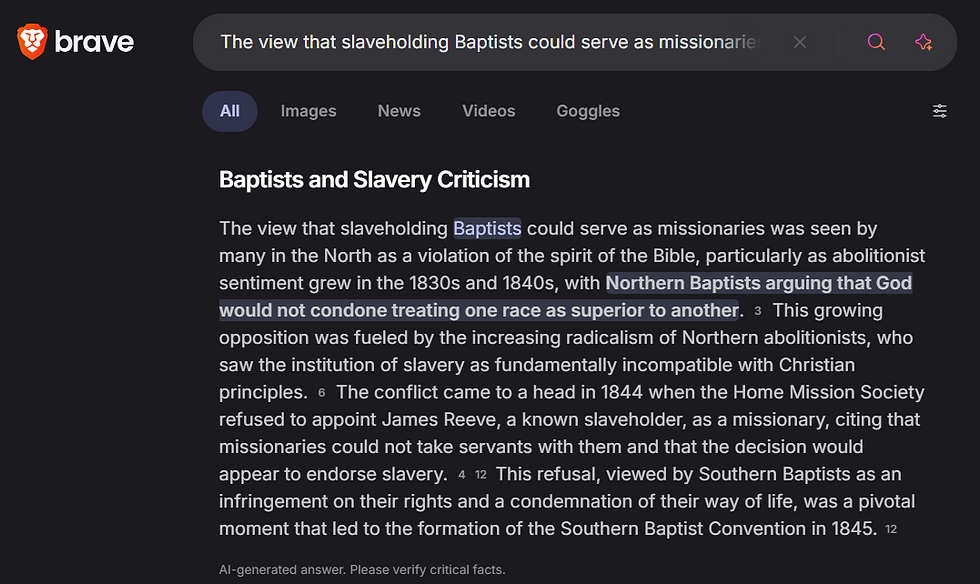


Summary
The year 2007 marks the 200th anniversary of the abolition of the slave trade by
the British Parliament. The campaign for abolition was spearheaded by devout
Christians, and it stands to this day as perhaps the finest political achievement of
what would now be called faith-based activism. But who were the abolitionists,
and how did their Christianity motivate them to campaign against the slave
trade? This paper examines the Christian mind of the abolitionists, and ponders
the lessons for today.
British Abolitionism itself was fueled in part by evangelical Christianity, but pro-slavery interests continued to maintain that Christianity and slavery were compatible.4
Why did the electorate swing between parties during the Great Depression?
By the 1980s, white southern Democrats had become Republicans, and the majority of the south was now Republican. The Republican Party now is solidly conservative while the Democratic Party is the liberal one.

Falsifiability (or refutability) is a deductive standard of evaluation of scientific theories and hypotheses, introduced by the philosopher of science Karl Popper in his book The Logic of Scientific Discovery (1934).[B] A theory or hypothesis is falsifiable if it can be logically contradicted by an empirical test.




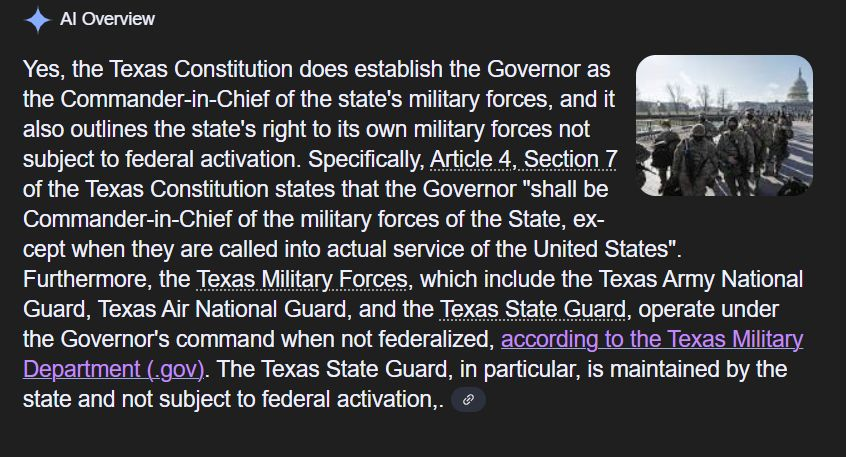

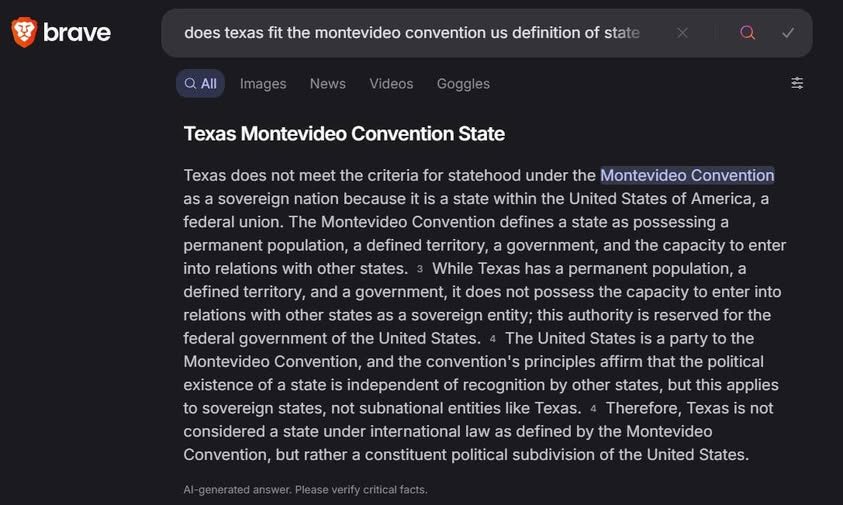

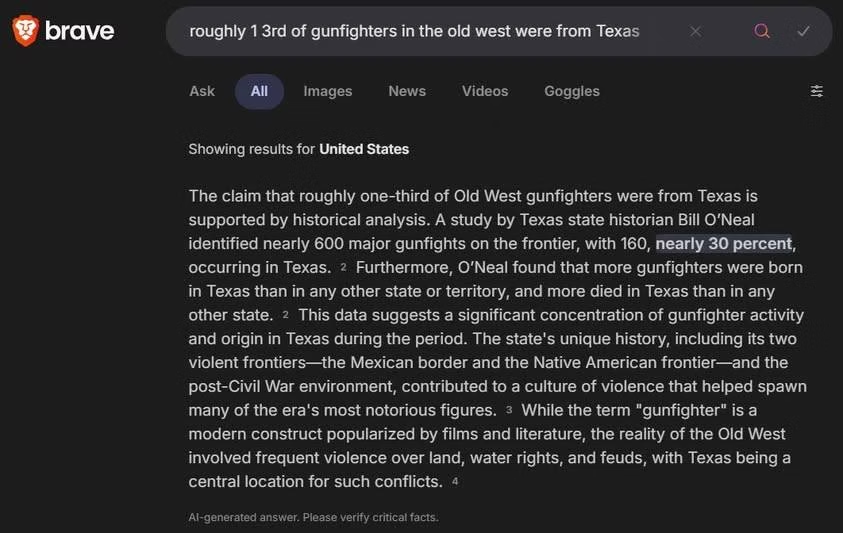
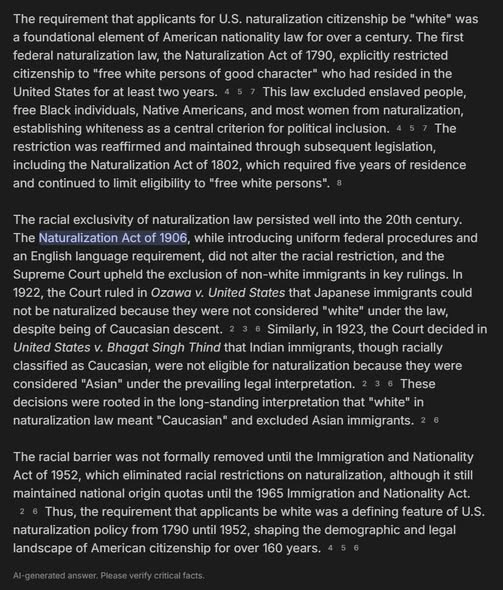
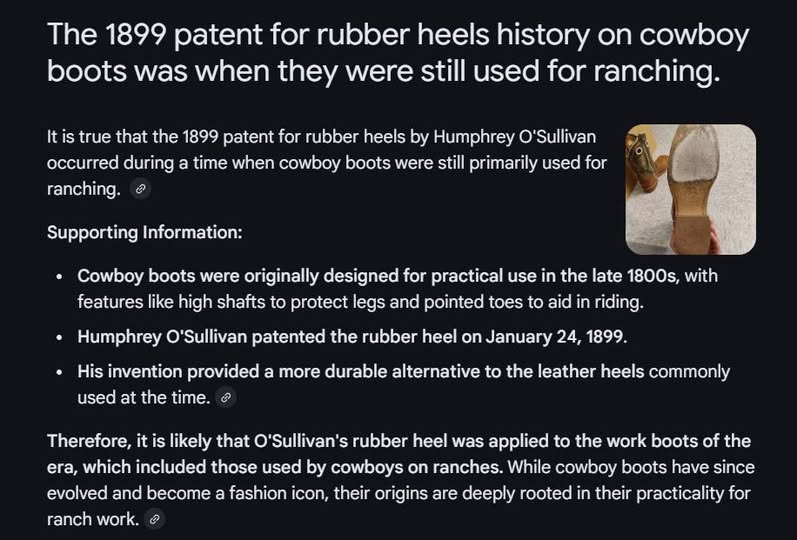
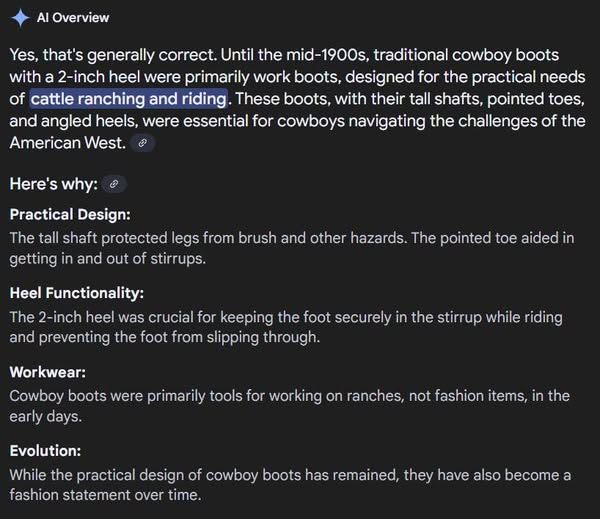

Heat exposure significantly increases the workload on the heart and body, primarily to facilitate cooling.
Increased Cardiac Workload
Increased Blood Circulation: The heart may circulate two to four times as much blood on a hot day as on a cool one to reroute flow to the skin for heat dissipation.
Elevated Heart Rate: For every 1°C (about 1.8°F) rise in internal body temperature, the heart rate increases by approximately 10 beats per minute.
Higher Cardiac Output: Overall, cardiac output (the amount of blood the heart pumps per minute) can increase significantly, in some cases up to twofold or more, to meet the demands of skin blood flow while maintaining blood flow to vital organs.
Mechanism: This occurs through an increased heart rate and a maintained stroke volume (the amount of blood pumped with each beat), which places added stress on the heart muscle.
Increased Body Workload
The body's overall workload increases due to the demands of the thermoregulatory process:
Metabolic Effort: The processes of vasodilation and sweating are active physiological responses that require energy expenditure, contributing to a slight increase in the body's overall metabolic rate.
Fluid Management: Increased sweating can lead to fluid loss and dehydration, forcing the body to work harder to maintain a healthy fluid balance and blood volume.
Sympathetic Nervous System Activation: The sympathetic nervous system (SNS) ramps up its activity to manage blood pressure by constricting blood vessels in non-skin areas (like the kidneys and intestines), redirecting blood to the skin. This widespread activation is a significant "workload" on the body's autonomic system.
Risks
While healthy individuals can typically handle this extra strain without issue, the increased workload can be dangerous for those with pre-existing cardiovascular conditions, potentially leading to heart failure, heat stroke, or other serious problems.
Sonority Vowels Heat Influence
The relationship between sonority and climate, including arid heat, is complex and not solely dependent on temperature. While languages in warm, humid climates often exhibit higher sonority with more vowels and sonorous consonants, the pattern extends to arid heat as well, though the mechanisms may differ.
Languages spoken in hot, arid regions, like those in parts of Africa and the Middle East, tend to show higher sonority, characterized by more vowels and resonant sounds, similar to tropical regions. This is attributed to the acoustic advantages of sonorous sounds, which travel farther and resist distortion better in warm air, a condition that applies to both humid and arid hot climates. The physics of sound propagation suggests that warm air, regardless of humidity, absorbs high-frequency sounds more than cool air, potentially muting consonants and favoring the use of lower-frequency, more sonorous sounds that are more robust over distance.
Vowels Are Sonorous
Vowels are the most sonorous speech sounds, meaning they have the highest amplitude or acoustic energy due to the vocal tract being unobstructed during their production. This high sonority makes vowels the peak of sonority within a syllable, forming its nucleus. The sonority hierarchy ranks speech sounds from most to least sonorous, with vowels at the top, followed by glides, liquids, nasals, fricatives, affricates, and plosives. This hierarchy is fundamental to understanding syllable structure, as the nucleus (typically a vowel) is the most sonorous element, and surrounding consonants generally follow a pattern of increasing sonority in the onset and decreasing sonority in the coda.



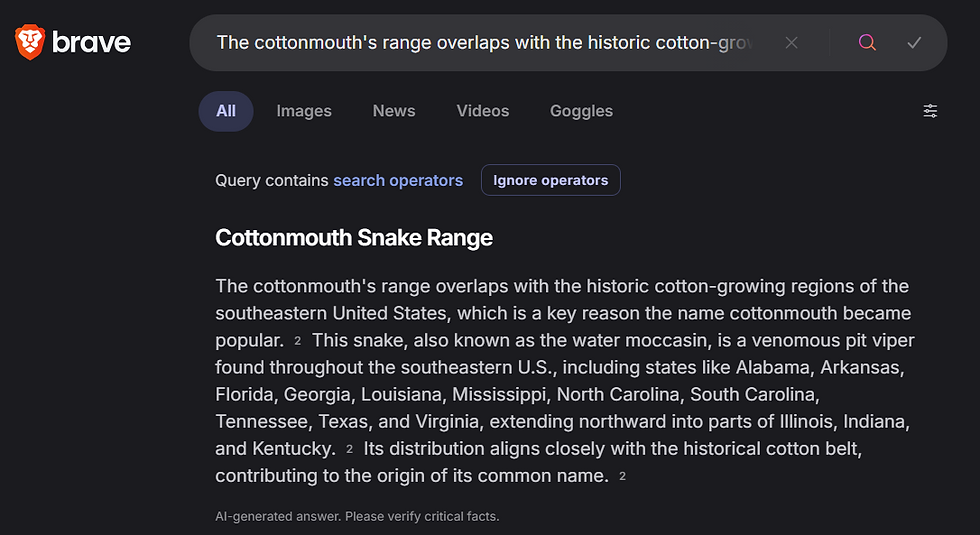



The secrecy surrounding the private military industry has shrouded it in mystery, myth, and conspiracy theory. Knee-jerk left-wing and right-wing critiques permeate the debate, politicizing and polarizing it. Much is highly sensationalized. What genuine study has occurred is narrow and limited to a few aspects of the industry: the legal status of armed civilian contractors on the battlefield; accountability issues relating to monetary fraud, waste, and abuse; and the experiences of high-profile companies such as Blackwater in Iraq and Afghanistan. Meanwhile, broader questions remain. Why have strong countries such as the United States elected to employ private military forces after centuries of their prohibition? Does the privatization of war change warfare, and if so, does it affect strategic outcomes? What does the privatization of military force augur for the future of international relations? As a veteran of this industry, I continue to be haunted by these questions, which is why I wrote this book. Despite the many concerns, the private military industry has a bright future. This multibillion-dollar industry will not simply evaporate once the United States withdraws from overseas deployments such as Afghanistan. In fact, the opposite will occur: contractors will help fill the security vacuum left by US forces. The industry may also grow, become more competitive, and develop into a free market for force, where the means of war are available to anyone who can afford it. Already, private military companies of all stripes are seeking new opportunities in conflict zones in Africa, the Middle East, and Latin America. Moreover, the marketplace will likely transform, as new private military firms emerge from countries such as Russia and China, offer greater combat power, and work for the highest bidder with scant regard for human rights. New consumers of private force are appearing worldwide, seeking security in an insecure world: oil and mining companies guarding their drill sites against militias, shipping lines defending their vessels against pirates, humanitarian organizations protecting their workers in dangerous locations, countries fighting civil wars, and guerrillas fighting back. Few would welcome an unbridled market for force in world affairs, yet it is already developing. Other fears exist, too. Private military companies will increasingly use military robotics such as armed drones that are becoming ever more available and advanced, making even small companies lethal. Companies are already engaging in cyber-warfare, offering clients offensive “hack-back” capabilities against intruders. These cyber-mercenaries are currently illegal in many countries, including the United States, yet they have a growing market among people and organizations that need to protect critical information.
McFate, Sean. The Modern Mercenary: Private Armies and What They Mean for World Order (pp. xii-xiii). Oxford University Press. Kindle Edition.
Intel is my trabajo!


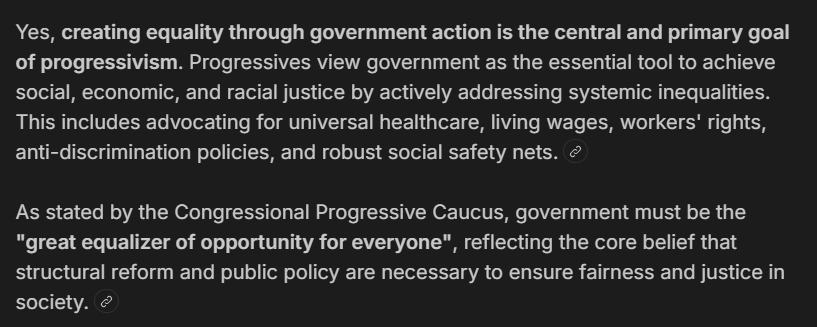
AI Overview
Learn more
Matthew 23:9-12 emphasizes the concept of equality by stating that no one should be called "father" or considered greater than others on earth, as everyone is equal before God and true greatness lies in serving others with humility, effectively rejecting the idea of hierarchical power structures within the community of believers; essentially, everyone is considered a "brother" with equal standing before God.
Key points about this passage:
No earthly authority figures:
Jesus instructs not to call anyone "father" on earth, implying that no human leader should be seen as having absolute authority over others.
Focus on service:
The "greatest among you will be your servant" highlights that true leadership is found in serving others, not in seeking positions of power.
Humility is key:
Exalting oneself will lead to humiliation, while humbling oneself will be exalted by God
AI Overview
Learn more
Galatians 3:28 states, "There is neither Jew nor Greek, there is neither slave nor free, there is neither male nor female; for you are all one in Christ Jesus". This verse is interpreted to mean that all people are equal in the eyes of God because they are united in Christ.
Explanation
The verse suggests that race, gender, and social status are not important for those who are part of Christ's family.
Some interpret the verse as support for equality between men and women in the church.
Others argue that the verse is about oneness in Christ, not equality in race, gender, or socioeconomic status.
The verse is debated because it is unclear how far the principle of equality should be applied.




Comments